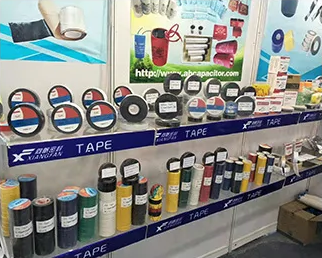The Versatility and Benefits of Self-Vulcanizing Tape
Self-vulcanizing tape, often referred to as self-fusing or self-amalgamating tape, is a specialized type of tape that is gaining popularity across various industries due to its remarkable properties and versatility. Made from a blend of silicone rubber, butyl rubber, or other elastomers, this tape is designed to bond to itself rather than to surfaces, creating an airtight and watertight seal. This article delves into the characteristics, applications, and advantages of self-vulcanizing tape.
Understanding Self-Vulcanizing Tape
The unique feature of self-vulcanizing tape lies in its ability to fuse layers together when wrapped upon itself. Unlike traditional adhesive tapes, which rely on sticky surfaces to adhere, self-vulcanizing tape relies on the physical properties of the material. When stretched and wrapped around an object, the tape forms a solid, cohesive mass that is not only durable but also resistant to various environmental factors.
One of the primary components of self-vulcanizing tape is its high-temperature resistance. This makes it ideal for applications in industries requiring materials that can withstand exposure to extreme temperatures, be it cold or hot. Additionally, its dielectric properties render it an excellent choice for electrical insulation tasks.
Applications of Self-Vulcanizing Tape
Self-vulcanizing tape finds applications in numerous fields
1. Electrical Insulation In electrical work, self-vulcanizing tape is used to insulate wire connections, particularly in situations where moisture resistance is paramount. It provides long-lasting insulation and protects against short circuits.
2. Automotive Industry Mechanics often use self-vulcanizing tape for emergency repairs on hoses, cables, and electrical connections. Its ability to form a durable seal makes it a reliable choice for roadside repairs.
3. Plumbing Repairs When leaks occur in pipes, self-vulcanizing tape serves as an effective temporary fix. By wrapping the tape around the damaged area, it creates a strong bond that halts the leak until a permanent solution can be implemented.
self vulcanising tape

4. Safety and Protection This tape is utilized in safety applications, such as securing tools, preventing wear on handles, and offering grip to aid in work stability.
Advantages of Using Self-Vulcanizing Tape
The benefits of self-vulcanizing tape are manifold
1. Ease of Use Unlike many traditional repair methods, self-vulcanizing tape requires no special tools or skills. It can be applied simply by stretching and wrapping it around the desired area.
2. Durability The resulting seal is not only strong but also resistant to UV light, ozone, and various chemicals. This durability ensures a long-lasting solution to repair needs.
3. Versatility It can be used on a variety of surfaces, including rubber, plastic, metal, and glass, making it an essential tool in any repair kit.
4. Non-Tacky Finish Unlike adhesive tapes that leave behind residue, self-vulcanizing tape does not adhere to surfaces, making it easy to remove without damage.
5. High Temperature Resistance Withstanding extreme temperatures, self-vulcanizing tape is suitable for both very hot and very cold environments, ensuring reliability across conditions.
In conclusion, self-vulcanizing tape is a highly effective and versatile tool that stands out in the realm of materials for repairs and insulation. Its unique bonding properties, ease of use, and resistance to various environmental factors make it an invaluable addition to any toolbox. Whether for electrical work, emergency repairs in the automotive sector, or plumbing fixes, self-vulcanizing tape continues to prove its worth in multiple applications, cementing its place as an essential material for both professionals and DIY enthusiasts alike.
-
XIANGFAN Rubber Tape-Ultimate Solutions for All Your Insulation NeedsNewsJun.24,2025
-
XIANGFAN Rubber Tape-Protection for Industrial and Residential ApplicationsNewsJun.24,2025
-
XIANGFAN Rubber Tape: Superior Safety and Sealing for Demanding EnvironmentsNewsJun.24,2025
-
XIANGFAN Rubber Tape: Reliable Solutions for Every Electrical ChallengeNewsJun.24,2025
-
XIANGFAN Electrical & Industrial Tape: Powering Reliability Across IndustriesNewsJun.24,2025
-
XIANGFAN Electrical & Industrial Tape: Excellence in Every ApplicationNewsJun.24,2025
